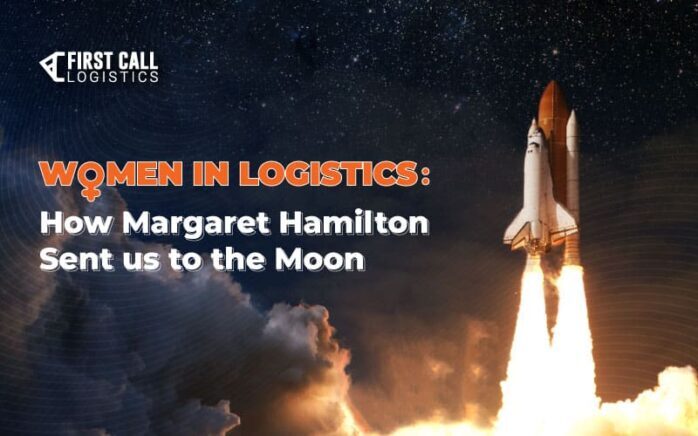Women in Logistics: How Margaret Hamilton Sent Us to the Moon

Apollo 11’s 1969 moon landing stands as one of the most monumental logistical undertakings in human history.
To accomplish such a feat at a time when room-sized computers with no screen interface had to be programmed through paper punch card readouts and data storage remained unthinkably primitive, NASA turned to MIT’s Instrumentation Laboratory for guidance. It was then, in an era before “software engineering” had even become a recognized field of study, that 25-year-old Margaret Hamilton stepped into her leading role in directing Apollo 11’s computer systems.
Margaret Hamilton’s Groundbreaking Programming
Hamilton’s biography alone could span volumes. She was a working mother in the ‘60s — already an outlier in that regard — who taught herself hexadecimal and binary programming languages and learned to program “mini operating systems” before such a thing formally existed in the field of computing. While not the only woman working to make NASA’s dreams of a man on the moon a reality, Hamilton predictably worked alongside teams of predominantly male programmers.
Her charge extended far beyond charting a course to the moon. The stakes invoked all the political pressures of the global space race, not to mention the lives of the astronauts onboard. Hamilton’s division was working against a ticking clock to solve a host of unknown variables, and to create computer software capable of making its own decisions in the face of unanticipated problems.
One of the first rules of computers — even now in this age of ChatGPT and groundbreaking AI — is that they can’t intuitively grade subjective information. Hamilton’s innovative programming methods worked out ways to load priorities into a system bound to encounter logistical challenges which couldn’t be anticipated, and to do so with less processing power than today’s average smart toaster. It was this ability to filter through error messages and ignore low-priority tasks which granted Mission Control confidence in Apollo’s landing module — even as it flashed warning messages seconds before touching down on the moon.
Logistical Challenges, Then and Now
NASA’s successful lunar landing gives us much to marvel at even now, as does Hamilton’s software at the beating heart of the mission’s safe return. Perhaps the most remarkable aspect of her accomplishments was the software’s ability to contextualize information, and even to “interrupt one task to take on a more important one.” This capability was so profound, it later provided the basis for the first U.S. space station.
And though the logistics of landing on the moon may seem like a far cry from our modern-day supply chain difficulties, we often find ourselves grappling with similar questions:
- How can we anticipate unknowable obstacles preventing safe transport?
- How do we tell a computer (or tool, or AI) to contextualize and prioritize the right logistical inputs?
- Will there ever be a one-code-fits-all solution to optimally move things from A to B?
At a time when nobody could’ve envisioned the power and capabilities of today’s technological devices, Margaret Hamilton’s creative solutions and dedication laid the very foundations of what became modern software engineering. Her pioneering efforts in the field of computer science led directly to one of humanity’s seminal achievements, and we can’t help but wonder in the present day what logistical innovations women in the industry will develop next to shape our collective future.
Join The First Call Crew
Want to build a career somewhere you can make a real impact? Consider joining the team at First Call Logistics. As a fast-growing 3PL, we’re expanding our footprint and hiring for multiple roles.
To learn more about our open opportunities, visit our careers page and apply today!
Meet the First Call Team
Interested in learning more about the amazing talent at First Call? Read some of our latest articles:
- Article: Careers In Logistics: Q&A with First Call’s Marc Withers
- Article: Careers In Logistics: Q&A with First Call’s Tarek Kabbani
- Article: Careers in Logistics: Q&A with First Call’s Tiffany Soots
- Article: Q&A with Director of Carrier Sales, Shawn Machowiak
- Article: Expedited Freight Delivery with Eric Alexander
Get the latest supply chain news and updates directly to your inbox.